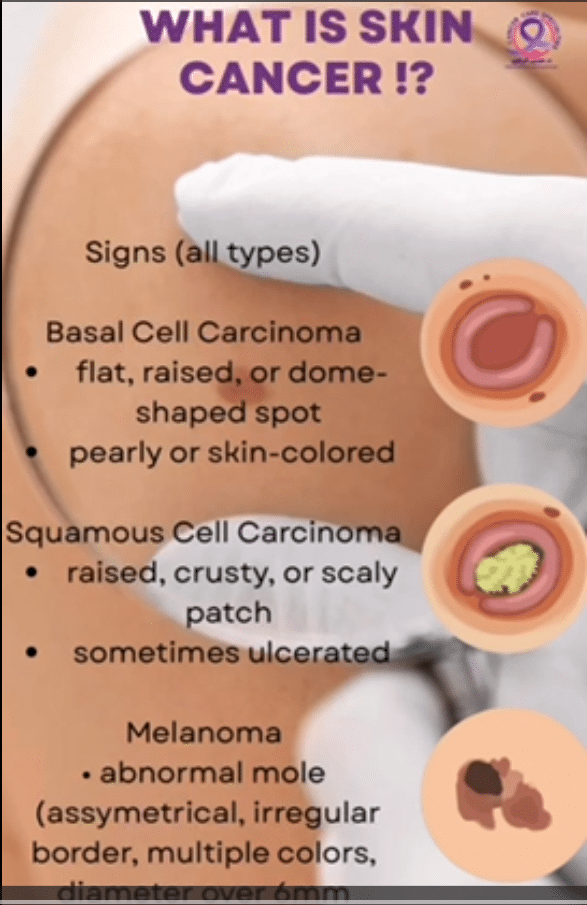info@cancercarespecialtiesmena.com

Melanoma Cancer: Understanding Skin Cancer and Its Warning Signs
Skin cancer is one of the most common yet preventable forms of cancer. Among its various types, melanoma is the most aggressive and potentially life-threatening. This awareness aims to educate individuals about recognizing early signs, understanding risk factors, and emphasizing the importance of timely medical evaluation.
What Is Skin Cancer?
Skin cancer occurs when abnormal cells in the skin begin to grow uncontrollably. It primarily develops due to overexposure to ultraviolet (UV) radiation from the sun or tanning beds. The image highlights the three main types of skin cancer—Basal Cell Carcinoma (BCC), Squamous Cell Carcinoma (SCC), and Melanoma—each presenting with distinct visual features and characteristics.
Types of Skin Cancer
1. Basal Cell Carcinoma (BCC)
Basal Cell Carcinoma is the most common and least dangerous type of skin cancer. It typically appears as a flat, raised, or dome-shaped spot that may be pearly or skin-colored. While it rarely spreads to other parts of the body, untreated BCC can cause local damage to surrounding tissues. Early detection and removal are crucial to prevent recurrence.
2. Squamous Cell Carcinoma (SCC)
Squamous Cell Carcinoma often manifests as a raised, crusty, or scaly patch of skin. In some cases, the area may become ulcerated or bleed. SCC is more aggressive than BCC and can spread if left untreated. It is frequently found on sun-exposed areas such as the face, neck, and hands.
3. Melanoma
Melanoma is the most serious form of skin cancer, developing in the pigment-producing cells known as melanocytes. It often presents as an abnormal mole with asymmetrical shape, irregular borders, multiple colors, and a diameter larger than 6mm. Melanoma can spread rapidly to other organs, making early diagnosis and intervention vital for survival.
Importance of Awareness and Prevention
Raising awareness about skin cancer, especially melanoma, can save lives. Regular skin self-examinations, use of sunscreen, protective clothing, and avoiding prolonged sun exposure are essential preventive steps. If any new or changing moles appear, seeking immediate evaluation from a dermatologist or oncologist is critical.
Conclusion
Melanoma awareness is more than just recognizing a mole—it’s about prioritizing skin health and early detection. With timely diagnosis, most skin cancers can be treated successfully. Remember: protecting your skin today can prevent melanoma tomorrow.